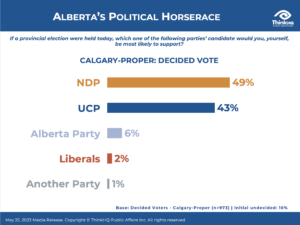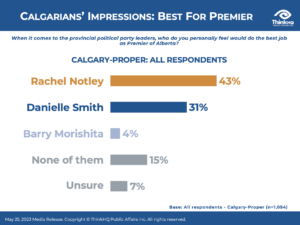
.
May 25, 2023 – FOR IMMEDIATE RELEASE
(Calgary) As the provincial election campaign 2023 ends, Rachel Notley’s New Democrats hold a modest lead over Danielle Smith’s UCP in seat-rich Calgary, according to the latest ThinkHQ Public Affairs survey.
City-wide, the New Democrats hold a slight lead in the campaign’s dying days with 49% of the decided vote, followed closely by the UCP with 43%, the Alberta Party with 6% and various other parties at 3%. Currently, only one-in-ten (10%) voters remain undecided in Calgary.
- The New Democrats enjoy a more notable lead over the Conservatives north of the river, with the UCP holding a slight advantage in the south
- The two parties are evenly matched in new/suburban and established communities, while the NDP has a 25-point lead in the inner city
- There are significant gender and age gaps in party support, with men and those aged 55+ showing a clear preference for the UCP, while women and voters under 54 are tilting NDP
- Vote intentions favour the NDP with rising levels of education
- The UCP retains 82% of their voters from 2019, while 15% plan to vote NDP and 3% are looking at other options. In contrast, the NDP are retaining 97% of their 2019 vote
- Looking across the political spectrum, an overwhelming share of self-identified “Left” voters are inclined to support the NDP (94%), while 84% of “Right” voters plan to cast their ballot for the UCP. Among “Centrist” voters, just over one-half (51%) plan to vote NDP compared to 36% UCP

The Push & Pull of Partisanship
There are nearly as many voters in Calgary today who feel “pushed” toward their choice as “pulled” toward it. Only one-half (50%) of eligible voters report that their decision will be guided by an attraction to one party and what they stand for, while almost as many (45%) say their vote will primarily be because they dislike the other parties even more.
- Likely NDP voters are split right down the middle, with roughly equal proportions saying they are voting for the NDP as opposed to “against” the others (primarily UCP)
- Likely UCP voters are more likely to say their decision is due to an affinity for the party and what they stand for (57%)
Leadership
Leadership plays a sizable role in voter decision-making, and in Calgary today NDP leader Rachel Notley holds a notable edge over the UCP’s Danielle Smith.
Just under one-half (49%) of those interviewed offer positive ratings of the NDP leader, compared to 47% who disapprove of Notley (36% strongly). Meanwhile, Danielle Smith’s ratings are decidedly negative, with 58% saying they dislike the UCP leader (49% strongly), while 38% hold a positive view of her.
Alberta Party leader Barry Morishita receives mixed reviews, with the majority of voters (56%) unable to offer a rating due to a lack of familiarity.
Notley’s Ratings
- Most favourable in the north and inner-city communities and among women
- Very popular among those under 35, with approval declining with age
- Most unpopular among those without post-secondary education
Smith’s Ratings
- More favourable south of the river and among men than women
- More popular among those aged 55+ (notably lower among those under 35), with approval increasing with age
- Lower approval among those living in the inner-city and those with a university education
Best Premier for Alberta
When asked which party leader would best lead the province, Rachel Notley is the preferred choice for a plurality of Calgarians. Fully 43% say Notley would be the best choice for premier, compared to Smith at 31%, Morishita at 4%, 7% unsure and 15% saying “None of them”.
- Preference for Notley is slightly higher in north Calgary and resounding in inner-city communities
- Those aged 55+ tend to favour Smith as premier, while Notley is decidedly favoured by those under the age of 35
- The view that Notley is the best choice for premier tends to increase with education levels

Voter & Partisan Certainty
The NDP enjoy an advantage over the UCP regarding the “firmness” of their vote.
When asked how certain they are to vote in the election, 75% of respondents report they are “absolutely certain” to cast a ballot (100 on a 100-point scale). On a methodological note, this measure is always prone to “Social Desirability Bias” and is invariably inflated. Nonetheless, it is an interesting measure for comparison across party voting intentions.
The NDP has a 6-point edge, with 84% of their likely voters saying they are “absolutely certain to vote” compared to 78% for the UCP. Meanwhile, only 30% of undecideds say they are very sure they will participate in the election.
A similar trend appears with vote intentions. Over six-in-ten (65%) likely NDP voters say they are “absolutely certain” in their party choice, while 59% of likely UCP voters respond in kind.
Interestingly, voters self-identifying as “Left” on the Left-Right Political Spectrum are most assured in their upcoming party choice (73%). In comparison, “Right” voters are notably less decisive about their vote (55%), and “Centrist” voters are most conflicted at 43%.
Commentary
Commenting on these survey results, ThinkHQ President Marc Henry notes:
“We knew Calgary, with 26 seats up for grabs, would be the battleground for this election. The NDP will likely pick up seats in the city; how many is a little tougher to gauge. Even with a 1,000+ sample, the margin of error is still +/- 3 points. Technically speaking, the two parties could be tied, and many of these seats look very competitive.
If these numbers hold over the weekend, the adage about horseshoes and hand grenades may apply here for the NDP. They could expect to capture up to 9 additional seats, but it would still leave them short of forming Government. The path to victory has always been easier for the UCP, given the number of safe rural seats they hold, whereas the NDP needs to thread a few needles to get there.
But there are some wrinkles. First, NDP support is more motivated and firmer than the UCP – among the MOST certain of voters, NDP has a 12-point lead, and that is the kind of election night which would likely put them over the 44-seat threshold in the Legislature (depending on how they have fared in a handful of other seats across the province).
On the other hand, the UCP has strong support among older voters (traditionally more habitual in voting) and enjoys some strength outside of the inner-city south of the river. Their biggest challenge is a voting bloc which has typically been supportive but now feels conflicted and challenged by Danielle Smith’s leadership.
Although early balloting has already begun, the election will likely be determined this weekend based on the final arguments put forward by the front-running parties and their strength on the ground in getting their voters to the polls.”
Click here to view the full release and methodology
-30-
Media Inquiries:
Marc Henry
President, ThinkHQ Public Affairs, Inc.
Marc@ThinkHQ.com
